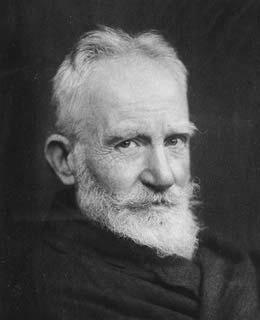George Bernard Shaw on HEARTBREAK HOUSE: An imaginary interview
by Dan Sullivan for Applause program magazine
 DS: How have you adjusted to the Great Beyond? You and Shakespeare must have wonderful conversations up there. I imagine you’ve buried the hatchet.
DS: How have you adjusted to the Great Beyond? You and Shakespeare must have wonderful conversations up there. I imagine you’ve buried the hatchet.
George Bernard Shaw (GBS): “Up there?” As you should have learned from Don Juan in Hell, all the interesting people are Down Here. This may explain why I’ve never run into Shakespeare. As for burying the hatchet—what hatchet? I honored Shakespeare’s magic as a wordsmith and fought for his plays to be presented as he had written them. But it was the artist-philosophers that interested me, and Shakespeare was no philosopher. The world to him was “a great stage of fools,” on which he was utterly bewildered.
But are we here to discuss Shakespeare or Shaw? What can I tell you about Heartbreak House?
DS: Explain its subtitle: A Fantasia in the Russian Manner. That sets us up for something brooding, something Chekhovian.
GBS: A Fantasia in the Russian Manner on English Themesis the complete phrase, and it describes the play exactly.
DS: How so?
GBS: Read my preface. “When Chekhov’s plays came to London, we stared and said, ‘How Russian.’ They did not strike me that way…
“Heartbreak House is cultured, leisured Europe before the war. Not a shot has been fired but the guns are loaded. As Chekhov and Tolstoy knew, our enervation in that cultivated drawing room atmosphere was delivering the world over to the control of ignorant and soulless cunning and energy, with the frightful consequences which have now overtaken it.”
DS: “Now” meaning 1919. So, you turn Chekhov’s overheated drawing room into a drafty English country house captained by a half-demented old sea dog with a beard like Bernard Shaw’s. And a horde of people come down from London for the weekend…
GBS: The same futile people as in Chekhov, cut to fit. Intelligent, cultured, obsessed with their careers and love affairs, refusing the drudgery of practical politics and community duties.
DS: And it all ends with a bomb. So: a dark, prophetic play that you didn’t put on stage until the war it predicted had ended. Why the delay?
GBS: Because when men are dying for their country is not the time to show their loved ones how they are being sacrificed to the blunders of boobies, the cupidity of capitalists, the ambition of conquerors, the electioneering of demagogues.
DS: And also because your early anti-war pamphlets had started a whispering campaign that you favored the Germans. It was a touchy period for you.
GBS: Fortunately it was a very short war. But there would have been nothing surprising in its lasting 30 years.
DS: And by 1940 the bombs were dropping again. England’s finest hour…as regularly celebrated on “Masterpiece Theater.”
GBS: What is there to say except that war puts a strain on human nature that breaks down the better half of it and makes the worst half a diabolical virtue? Better for us that it broke us down altogether. Then the warlike way out of our difficulties would be barred to us and we should take greater care not to get into them.
DS: “Navigate!” seems to be Captain Shotover’s advice to his countrymen at the end of the play. But your preface— which I have read—suggests that Britain’s political leaders at the time could hardly read a map, although they could mount a horse. May I quote you?
GBS: Accurately, please.
DS: “The barbarians were not only literally in the saddle, but on the front bench of the House of Commons, with nobody to connect their incredible ignorance of modern thought and political science but upstarts from the counting house who had spent their lives furnishing their pockets instead of their minds.”
GBS: Very good.
DS: No wonder the Chekhov people didn’t want to get involved with them. Meanwhile common folk thought that public issues weren’t for them to discuss.
GBS: Or that it was all “spin,” as your generation puts it. In the language of 1919—if you can quote me, so can I— “The orators of the front bench can edify or debauch an ignorant electorate at will. Thus our democracy moves in a vicious circle.”
DS: Rather than history, this sounds like the evening news. Have things improved since your day? Have we learned anything?
GBS: “We have all had a great jolt,” I said after the war. Now I’d say a series of great jolts—a chain reaction, if you will. They have not produced a better world. And yet you are far more conscious of your condition than we were, and far less disposed to submit to it.
DS: Just one more. My wife wants to know how you knew so much about women.
GBS: I have always assumed that a woman is a person exactly like myself and that is how the trick is done. Goodbye.
Dan Sullivan is director of the O’Neill Theater Center’s National Critics Institute; and teaches arts writing at the University of Minnesota.
HEARTBREAK HOUSE plays The Space Theatre through April 29. Tickets: 303.893.4100 or www.denvercenter.org.
2 notes
cendreseternelles liked this
denvercenterblog posted this
